Tag Archives: SC Progressive Network
Don’t let anyone steal your vote
Heading to the polls? Keep this number handy: 866-OUR-VOTE
A nonpartisan hotline is now live for voters in South Carolina who have voting-related questions or want to report problems they experience or witness at the polls.
The Election Protection Coalition, in alliance with in-state nonpartisan organizations, is working to ensure that everyone has an equal opportunity to vote in South Carolina. In addition to the 1-866-OUR-VOTE hotline, trained nonpartisan volunteers will be on the ground across the state to provide voters assistance at the polls on Election Day.
“This will be the 12th year that this free, nonpartisan service has helped South Carolina voters with problems at the polls,” said SC Progressive Network Education Fund Director Brett Bursey. “Beyond providing help to voters, reports to the hotline provide the only nonpartisan, real-time, statewide audit of the state’s election system that helps identify problems to address before the next election.”
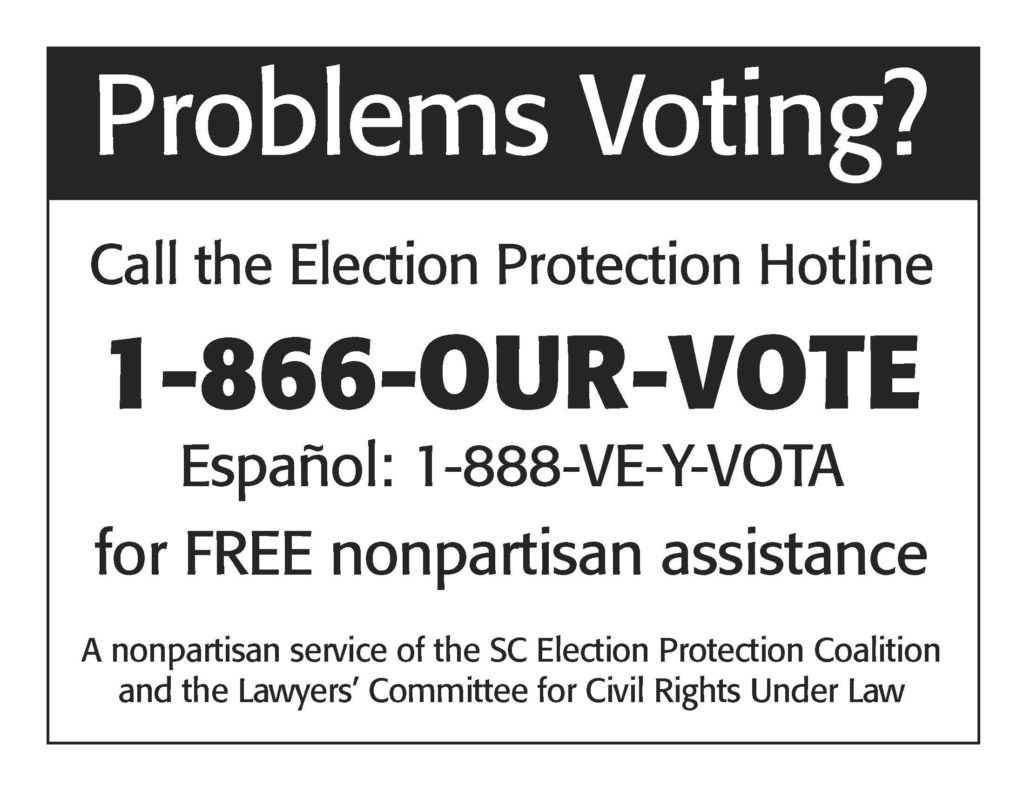
By calling the hotline, voters can confirm their registration status, find their polling location, and get answers to questions about proper identification at the polls.
Voters who have been required to vote a provisional ballot should call the hotline for advice prior to the certification hearing on their provisional ballot that take place in each county’s election office on Nov. 6.
“Voters must be aware that the state’s photo ID requirements will be enforced for voting in person at all locations” said Susan Dunn, attorney for the ACLU of South Carolina. All voters are required to show a valid ID that includes: driver’s license, DMV-issued ID card, passport, concealed weapons permit, federal military ID, or their photo-voter registration card with them to the polls on Election Day.
Dunn said, “We recommend to voters without one of the accepted IDs to trade their paper voter registration card in at their county elections office for one with a photo on it.”
Court to consider SC Progressive Network case to extend voter mail-in registration
Given the unique challenges posed by the COVID-19 pandemic, the SC Progressive Network Education Fund has filed suit to extend voter registration beyond the Oct. 6 deadline for mail-in applications in South Carolina.
A hearing before US District Court Judge Mary Geiger Lewis is scheduled for 11am on Tuesday, Oct. 6, in the Mathew Perry Federal Court House in Columbia. The hearing is open to the public with appropriate ID and face coverings.
The Columbia-based Network Education Fund, a 25-year-old nonpartisan policy and research institute, has been monitoring the state’s election and campaign systems since its formation in 1996. Since 2004, the Network’s Missing Voter Project (MVP) has been doing voter education and registration in the state’s historically under-represented communities.
Network Director Brett Bursey said, “We are nonpartisan, so we don’t focus on candidates. Our job is to help citizens understand how state and local government policies affect their lives so they can make informed decisions about registering and voting.”
For 16 years, trained MVP volunteers have registered voters at events and locations around the Midlands, several thousand in each presidential election year. This year, the MVP partnered with the SC NAACP State Conference to train young Black members on nonpartisan registration practices in 26 counties. Those grassroots efforts were complicated by the pandemic and our commitment to keep volunteers and the public safe.
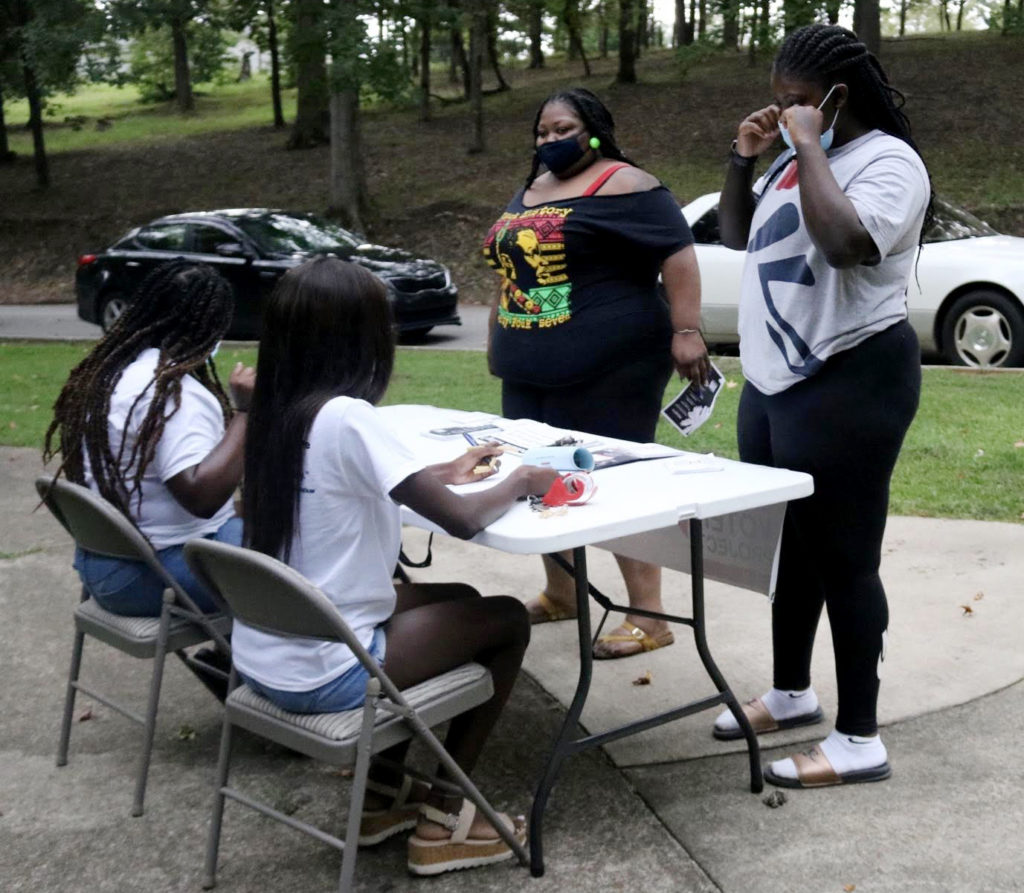
“Since March,” Bursey said, “health centers, bus transit stations, food banks, and schools have been shuttered or restricted, and large public gatherings have gone virtual. As a result, we have registered just several hundred citizens.”
According to the National Conference of State Legislatures, South Carolina is one of only six states that close voter registration 30 days before elections. The Network’s complaint, filed on Oct. 2, points out that the current 30-day provision became law in the 1895 State Constitution, which was written specifically to exclude Black citizens from voting. “The 30-day ban was implemented before the age of cars and electronic transmission of voter registration documents,” Bursey said. In 26 states, citizens may register and vote on the same day.
The complaint notes that the State Election Commission in the past has supported moving the registration period closer to the elections, citing extensions the SEC has provided due to hurricanes. “There is no doubt that pandemic safety measures and government restrictions have prevented some citizens from registering and participating in the next election,” Bursey said.
The SC Progressive Network Education Fund is represented in this case by Free Speech For People; Emery Celli Brinckerhoff Abady Ward & Maazel LLP; and Burnette Shutt McDaniel P.A.
Network’s Missing Voter Project is powering a people’s movement, one voter at a time
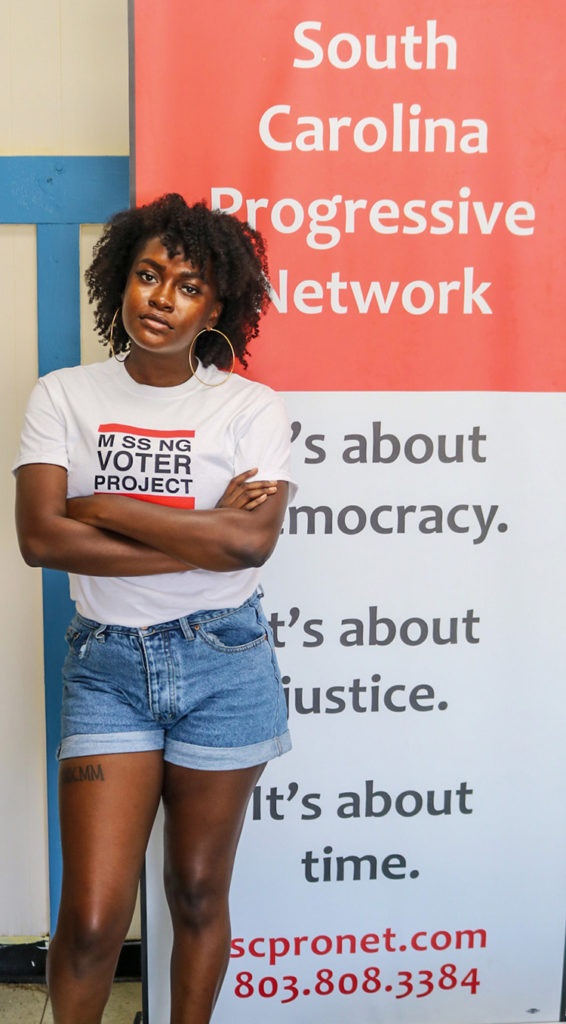
The Missing Voter Project was launched in 2004 to reach and mobilize new and infrequent voters in South Carolina.
Unlike other voter registration drives, the MVP is nonpartisan, ongoing, and focused on historically under-represented communities.
It was created by the SC Progressive Network to grow an informed electorate with the power to mobilize around public policies critical to young people, working families, and communities of color in South Carolina.
While most voter registration drives start anew each election cycle, the MVP works year-round to inform citizens about local and county matters that impact their lives, and to invite them to become involved in a growing movement for social and political change.
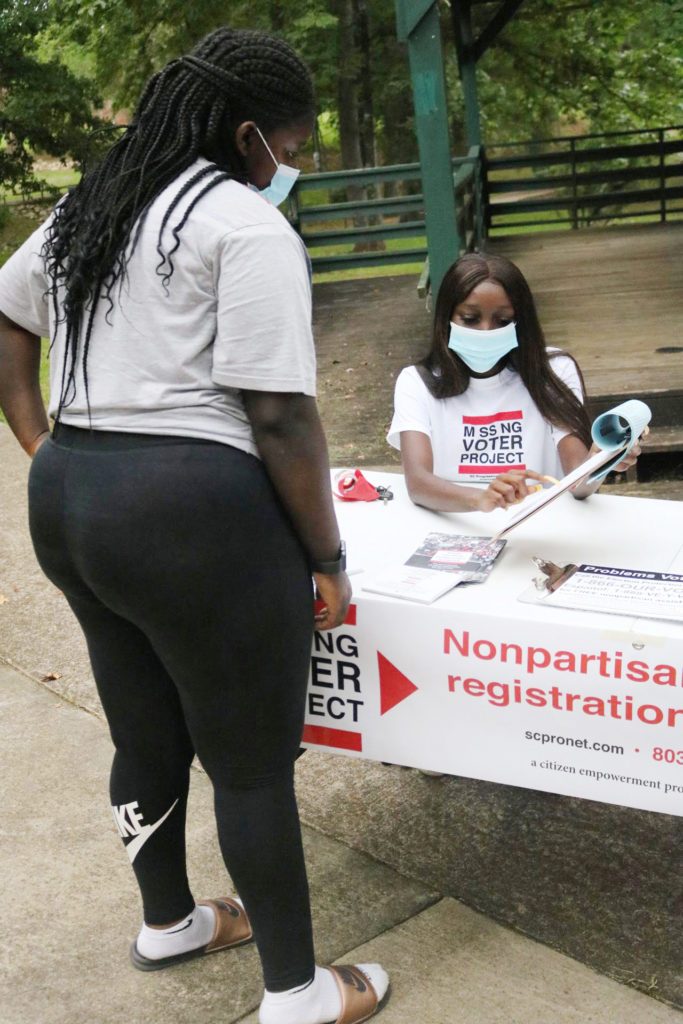
This year, the MVP is using a novel peer-driven approach of asking young, Black voters to reach young, Black non-voters and get them to the polls in November.
Just 15% of South Carolina’s Black voters under age 26 went to the polls in the last general election. Those voters are central to our 2020 MVP campaign.
Over the summer, MVP organizers targeted Saluda and Fairfield, taking advantage of the relationships the Network has built in those counties over the 26 years it has been organizing.
This year, we are raising funds to recruit county-based MVP teams from the 23,087 young Black South Carolinians who voted in the last general election. We challenged them to be the catalyst to turn out record numbers of young, Black voters in 2020. They have the numbers to change history.
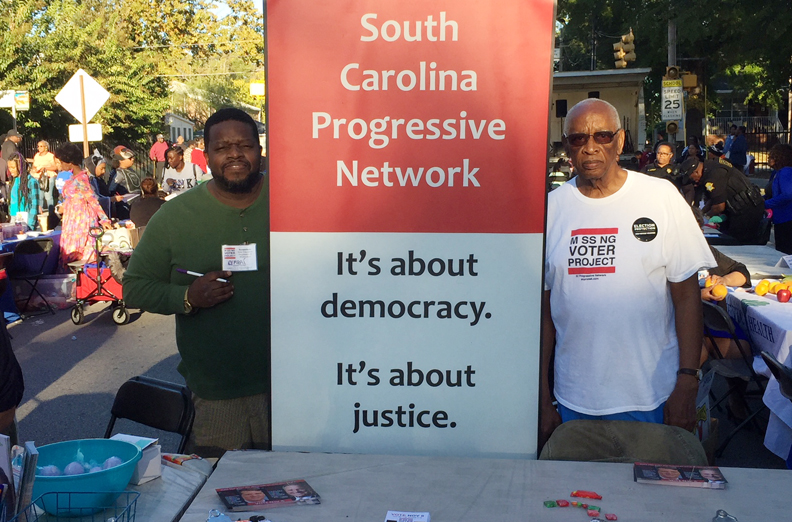
Whether or not the MVP succeeds in that goal this year, we will have laid the groundwork for a multi-year plan to level the imbalance of power codified in the state’s current constitution, created in 1895 specifically to disenfranchise its African-American citizens.
A reckoning is upon us.
These are perilous times, to be sure, but they offer an unprecedented opportunity to challenge, and begin to dismantle, South Carolina’s racially segregated politics.
What we do between now and the election on Nov. 3 can change our lives for many years to come.
While 78% of South Carolina’s nonwhite voting-age population is registered, only half of them regularly vote. An average of 500,000 of the state’s one million registered Blacks (along with 100,000 unregistered citizens), are sitting out the elections. If those “missing voters” were mobilized, it could change everything.
The continuing racial disparities in jobs, housing, health care, poverty, education, and the criminal justice system show that Black lives are devalued in South Carolina. It is not an accident, and it is a problem that won’t fix itself.
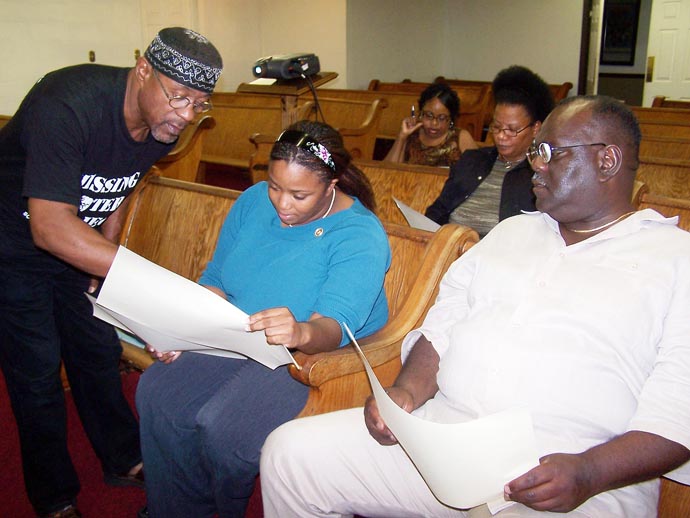
Reality check: for decades, incumbent legislators have been allowed to carve political maps to retain their power by packing Black and White voters into racially segregated political districts. This creates safe seats for incumbents but dilutes the effectiveness of Black votes on state policies.
The MVP is working to motivate and sustain Black civic engagement by showing that we can increase the turnout of Black voters by 200,000 in the only political district that cannot be gerrymandered: a statewide race.
The average margin of victory in the last three governor’s races was only 125,877 votes. If our plan works, it would prove to the half-million Black registered nonvoters that if political districts were not racially segregated their vote could change public policy.
By 2022, an energized Black electorate in South Carolina could determine the state’s next governor, attorney general, and superintendent of education.
The 2020 MVP training will prepare activists to organize county-based petitions in 2021 to force a constitutional amendment on the 2022 ballot to end race-based redistricting. It is part of the Network’s Fair Maps campaign to end partisan gerrymandering in South Carolina. See FairMapsSC.com for details.

This year’s MVP campaign is designed to train and sustain county-based teams of activists who understand that to make meaningful change will take commitment and longterm vision.
Training includes a component to involve MVP organizers in the statewide election protection work that the Network has anchored since 2004, when the nation’s first paperless voting system was implemented.
MVP volunteers will meet their county’s election director, become credentialed poll watchers, and have the opportunity to participate in their county’s vote certification process.
Volunteer organizers will be trained to help with Census enumeration. With only 57% of citizens counted, South Carolina ranks 44th among states. Each uncounted resident costs our cash-strapped state $15,000 in federal funds this decade.
Last year, we partnered with the new leadership of the NAACP State Conference to test the 2020 MVP to see whether it could effectively be launched statewide. The Memorandum of Understanding was enthusiastically endorsed by the national NAACP office. The plan set our two-county model in place.
As the pandemic worsened, we adjusted recruiting, training, and mobilization strategies to keep organizers and the public safe.
We mailed a letter to young Black voters in our two targeted counties — Saluda and Fairfield — inviting them to join their county MVP team.
It took until 2018 for majority-Black Fairfield County to elect its first Black state representative since Reconstruction.
Ten years earlier, the MVP conducted its first student training at the only high school in Fairfield County. The team registered three times as many new voters than had previously voted. At almost 25%, the county now has the state’s second-highest youth participation rate.
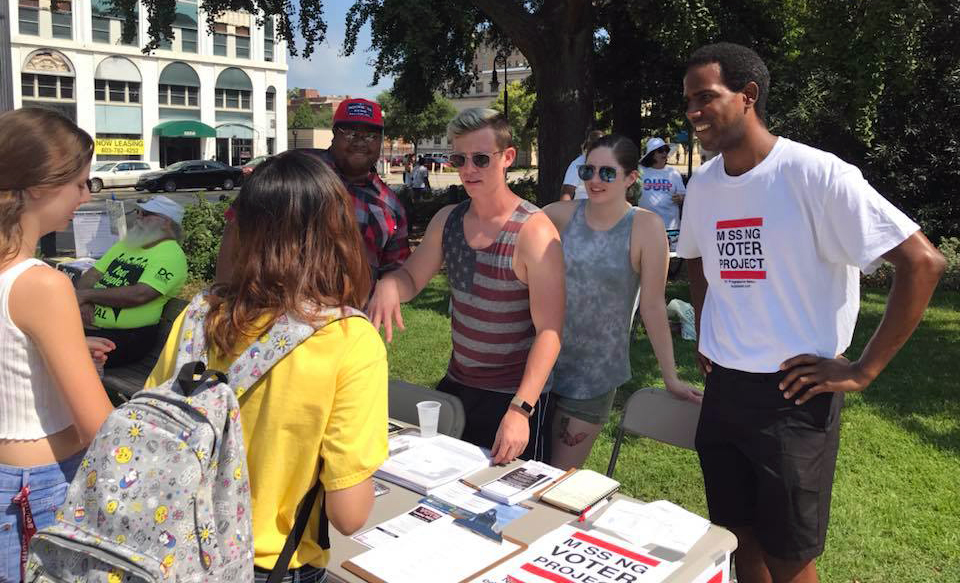
Saluda County is majority-White, and had just 65 young, Black voters in 2018. For decades, the Network has worked with the Riverside CDC, the only enduring civic engagement organization in the county. It prepared us for this campaign.
The level of capacity in this rural county with poor broadband service is requiring a different organizing model than in Fairfield. The differences between the two inform how we are conducting MVP outreach in other counties.
In Saluda and Fairfield counties, the NAACP Branch has partnered with local Network members to support the MVP teams. With their help, we are soliciting community buy-in to help sustain core teams of local activists beyond 2020. We are paying a stipend to trained organizers. The more money we raise, the more boots we can put on the ground.
In both counties, a vibrant organizing core is taking root. Word is getting out that something is happening.
Each week, MVP volunteers are being trained through Zoom sessions, supplemented with socially distanced and masked in-person meetings.
Training includes a short course on democracy and a brief but critical history lesson that explains how our democracy was made — and how we can remake it to be more equitable for a new generation.
The young organizers are excited about leading such a bold and hopeful plan. They are making their first round of calls to other young voters in their county using the State Voices database and an automated Virtual Phone Bank that trained volunteers can access from their phones.
When that list is finished, they will begin calling the registered voters their age who didn’t vote. The next round of calls will go to unregistered young people. And when they have contacted and cajoled their peers, they will then begin calling the county’s older citizens.
With organizing underway in the model counties, the MVP is focusing on Richland County, which houses the state Capitol as well as two HBCUs.
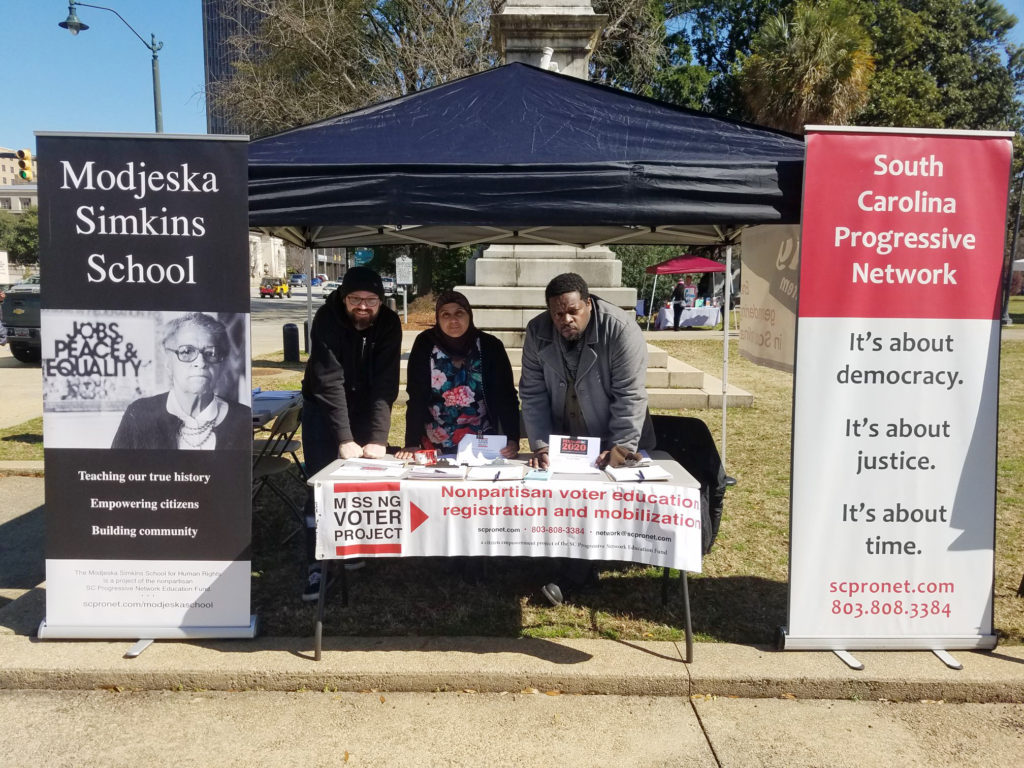
Just 4,306 out of 27,397 young, Black residents of Richland County voted in 2018.
We can change that. 2020 offers an unprecedented opportunity to reconsider our shared values and transform the institutions that have failed in South Carolina by creating systems that work for everyone, not the select few.
There are no short cuts when it comes to grassroots organizing. Trust takes time. Our years of developing ties in some of the state’s most neglected counties has laid the groundwork for us to take the MVP into communities where we can make the biggest impact — not just in the next election, but for decades to come.
While 78% of South Carolina’s nonwhite voting-age population is registered, only half of them regularly vote. An average of 500,000 of the state’s one million registered Blacks (along with 100,000 unregistered citizens), are sitting out the elections. If those “missing voters” were mobilized, it could change everything.
The continuing racial disparities in jobs, housing, health care, poverty, education, and the criminal justice system show that Black lives are devalued in South Carolina. It is not an accident, and it is a problem that won’t fix itself.
Reality check: for decades, incumbent legislators have been allowed to carve political maps to retain their power by packing Black and White voters into racially segregated political districts. This creates safe seats for incumbents but dilutes the effectiveness of Black votes on state policies.

The MVP is working to motivate and sustain Black civic engagement by showing that we can increase the turnout of Black voters by 200,000 in the only political district that cannot be gerrymandered: a statewide race.
The average margin of victory in the last three governor’s races was only 125,877 votes. If our plan works, it would prove to the half-million Black registered nonvoters that if political districts were not racially segregated their vote could change public policy.
By 2022, an energized Black electorate in South Carolina could determine the state’s next governor, attorney general, and superintendent of education.
The 2020 MVP training will prepare activists to organize county-based petitions in 2021 to force a constitutional amendment on the 2022 ballot to end race-based redistricting. It is part of the Network’s Fair Maps campaign to end partisan gerrymandering in South Carolina. See FairMapsSC.com for details.
This year’s MVP campaign is designed to train and sustain county-based teams of activists who understand that to make meaningful change will take commitment and longterm vision.
Training includes a component to involve MVP organizers in the statewide election protection work that the Network has anchored since 2004, when the nation’s first paperless voting system was implemented. MVP volunteers will meet their county’s election director, become credentialed poll watchers, and have the opportunity to participate in their county’s vote certification process.
Volunteer organizers will be trained to help with Census enumeration. With only 57% of citizens counted, South Carolina ranks 44th among states. Each uncounted resident costs our cash-strapped state $15,000 in federal funds this decade.
Last year, we partnered with the new leadership of the NAACP State Conference to test the 2020 MVP to see whether it could effectively be launched statewide. The Memorandum of Understanding was enthusiastically endorsed by the national NAACP office. The plan set our two-county model in place.
As the pandemic worsened, we adjusted recruiting, training, and mobilization strategies to keep organizers and the public safe.
We mailed a letter to young Black voters in our two targeted counties — Saluda and Fairfield — inviting them to join their county MVP team.
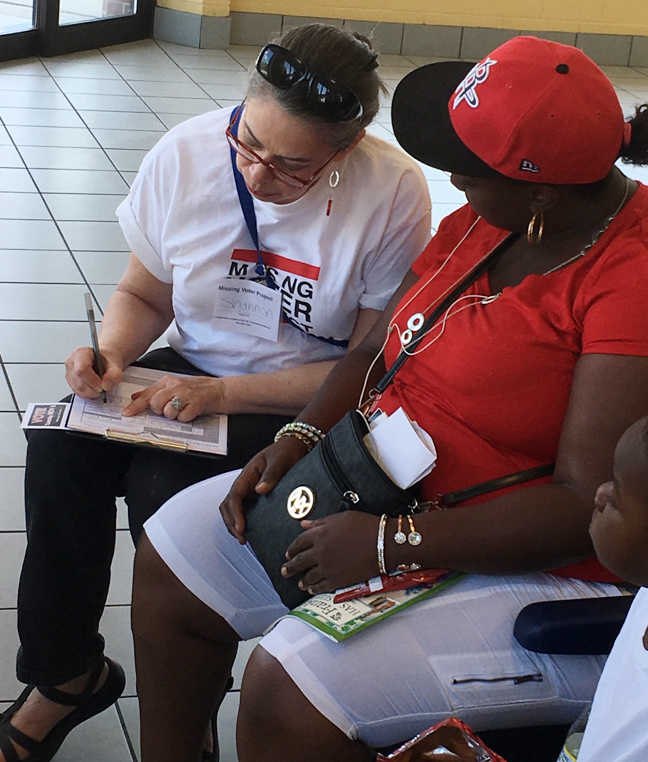
It wasn’t until 2018 that majority-Black Fairfield County elected its first Black state representative since Reconstruction.
Ten years earlier, the MVP conducted its first student training at the only high school in Fairfield County. The team registered three times as many new voters than had previously voted. At almost 25%, the county now has the state’s second-highest youth participation rate.
Saluda County is majority-White, and had just 65 young, Black voters in 2018. For decades, the Network has worked with the Riverside CDC, the only enduring civic engagement organization in the county. It prepared us for this campaign.
The level of capacity in this rural county with poor broadband service is requiring a different organizing model than in Fairfield. The differences between the two inform how we are conducting MVP outreach in other counties.
In Saluda and Fairfield counties, the NAACP Branch has partnered with local Network members to support the MVP teams. With their help, we are soliciting community buy-in to help sustain core teams of local activists beyond 2020. We are paying a stipend to trained organizers. The more money we raise, the more boots we can put on the ground.
In both counties, a vibrant organizing core is taking root. Word is getting out that something is happening.
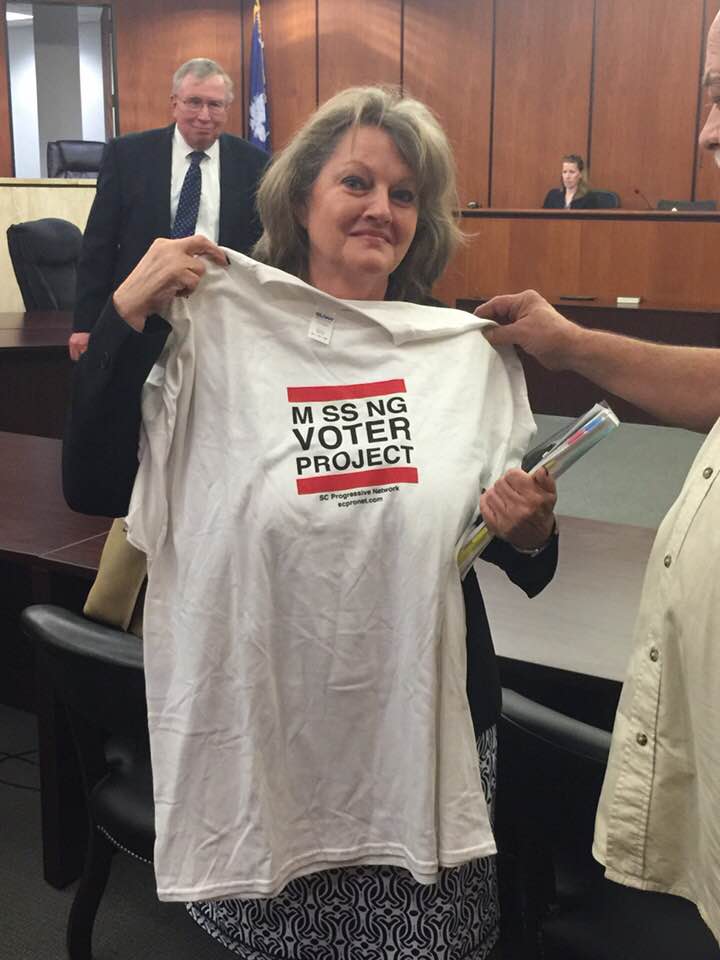
Each week, MVP volunteers are being trained through Zoom sessions, supplemented with socially distanced and masked in-person meetings.
Training includes a short course on democracy and a brief but critical history lesson that explains how our democracy was made — and how we can remake it to be more equitable for a new generation.
The young organizers are excited about leading such a bold and hopeful plan. They are making their calls to other young voters in their county using the State Voices database and an automated Virtual Phone Bank that trained volunteers can access from their phones. When that list is finished, they will begin calling the registered voters their age who didn’t vote. The next round of calls will go to unregistered young people. And when they have contacted and cajoled their peers, they will then begin calling the county’s older citizens.
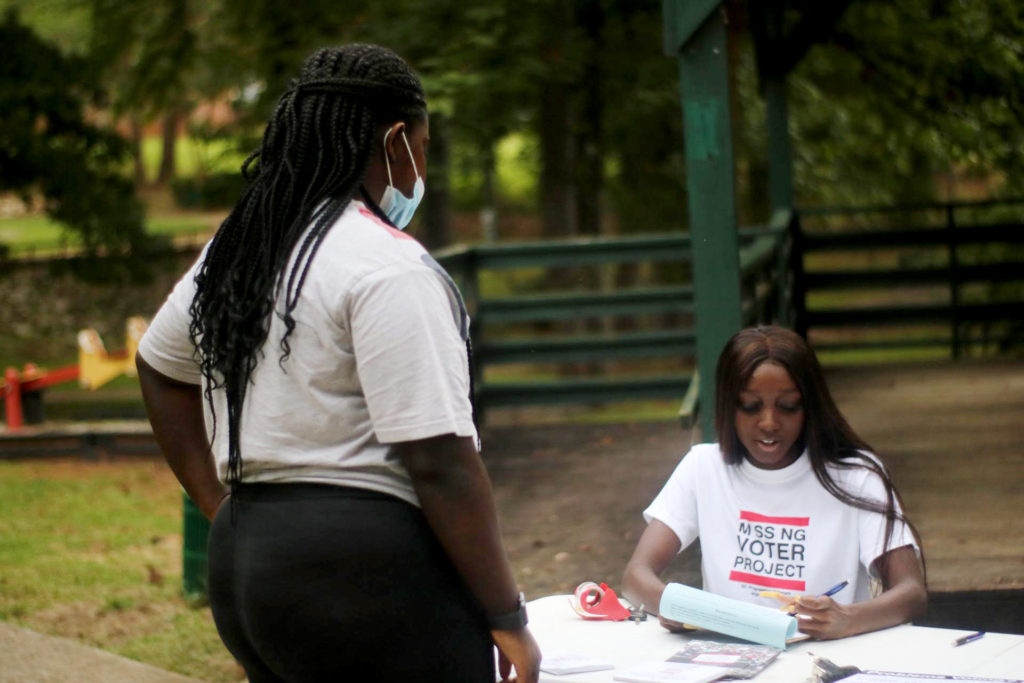
With organizing underway in the model counties, the MVP is focusing on Richland County, which houses the state capitol as well as two HBCUs.
Just 4,306 out of 27,397 young, Black residents of Richland County voted in 2018.
We can change that. 2020 offers an unprecedented opportunity to reconsider our shared values and transform the institutions that have failed in South Carolina by creating systems that work for everyone, not the select few.
There are no short cuts when it comes to grassroots organizing. Trust takes time. Our years of developing ties in some of the state’s most neglected counties has laid the groundwork for us to take the MVP into communities where we can make the biggest impact — not just in the next election, but for decades to come.
Please VOLUNTEER or DONATE!
MissingVoterProject.com
• • •
Network and allies press DHEC to take mandatory measures on COVID guidelines for workers
Workers invited to provide legal testimony
Organizations representing scores of thousands of members across the state sent a letter today to the Board of the SC Dept. of Health and Environmental Control citing DHEC’s authority, and responsibility, to issue and enforce mandatory compliance with the agency’s COVID-19 safety measures. The organizations represent the public at risk, as well as the workers and their families who are being required to work or face being fired for following Gov. Henry McMaster and DHEC’s advice to follow CDC guidelines during the pandemic.
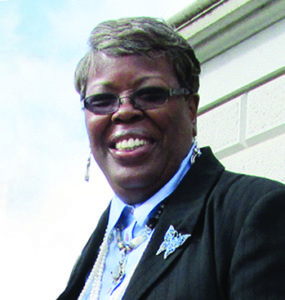 “It is clear that urging citizens and employers to mask up and follow safety guidelines isn’t working,” said Rep. Gilda Cobb-Hunter, Executive Director of CASA Family Systems, an Orangeburg-based shelter for battered women and children. “The virus has become a political issue, and DHEC must stand up for science or we are all going to continue to suffer,” Cobb-Hunter said.
“It is clear that urging citizens and employers to mask up and follow safety guidelines isn’t working,” said Rep. Gilda Cobb-Hunter, Executive Director of CASA Family Systems, an Orangeburg-based shelter for battered women and children. “The virus has become a political issue, and DHEC must stand up for science or we are all going to continue to suffer,” Cobb-Hunter said.
SC NAACP President Brenda Murphy stressed the disproportionate impact of the virus on working people of color. “Those most vulnerable to the disease are the least protected workers,” Murphy said. “They fear getting fired if they challenge unsafe conditions at work.”
The letter to the DHEC Board points out that the governor’s Executive Order declaring a State of Emergency ordered DHEC to “utilize any and all necessary and appropriate emergency powers, as set forth in the Emergency Health Powers Act (Title 44, Chapter 4 of the SC Code of Laws) that regulates your agency: During a state of public health emergency, DHEC must use every available means to prevent the transmission of infectious disease and to ensure that all cases of infectious disease are subject to proper control and treatment.”
SC AFL-CIO Charles Brave Jr. said, “The governor wants to sound like he has no enforceable authority to require that COVID guidelines be followed, but we know that’s not true. His priority of keeping corporate profits up and workers’ rights down is killing people.”
The Charleston Alliance for Fair Employment (CAFE) fights for wage workers in the hospitality and service industries. “Our members don’t have sick leave, and will get fired if they don’t show up for work,” said CAFE President Kerry Taylor. “Many of them are single mothers who are forced to work sick or lose their income if they have to stay home with a sick child.”
“The pandemic underscores how cruel public policies are in South Carolina,” said Brett Bursey, Executive Director of the SC Progressive Network‘s 24-year-old nonpartisan policy institute. The state has a long history of sacrificing workers’ health for corporate profit.”
The Network fought legislation introduced in 2013 to prohibit local governments from establishing sick leave policies to prevent sick workers from spreading diseases. In 2017, Gov. McMaster signed the anti-sick leave legislation into law.
The bill was promoted by the same hospitality corporations that comprised the governor’s accelerateSC task force that contributed over $21,000 to his current campaign account. Members of the House Ways and Means Committee, which passed the Hospitality Task Force’s $2 billion COVID relief budget last month, received over $100,000 in campaign contributions from the same hospitality industry that relies on low-wage service workers with no sick leave. They did this without a public hearing.
Workers and their families threatened by the state’s failure to adequately address the continuing spread of the virus and their potential loss of employment are encouraged to contact the Network at 803-808-3384 or email network@scpronet.com. Fast food workers should address their concerns to CAFE at kerryt33@gmail.com. Workers testimony is needed to develop a legal case seeking to compel state agencies compliance with existing statutes regulating health emergencies.
SC progressive community loses one of its own to coronavirus
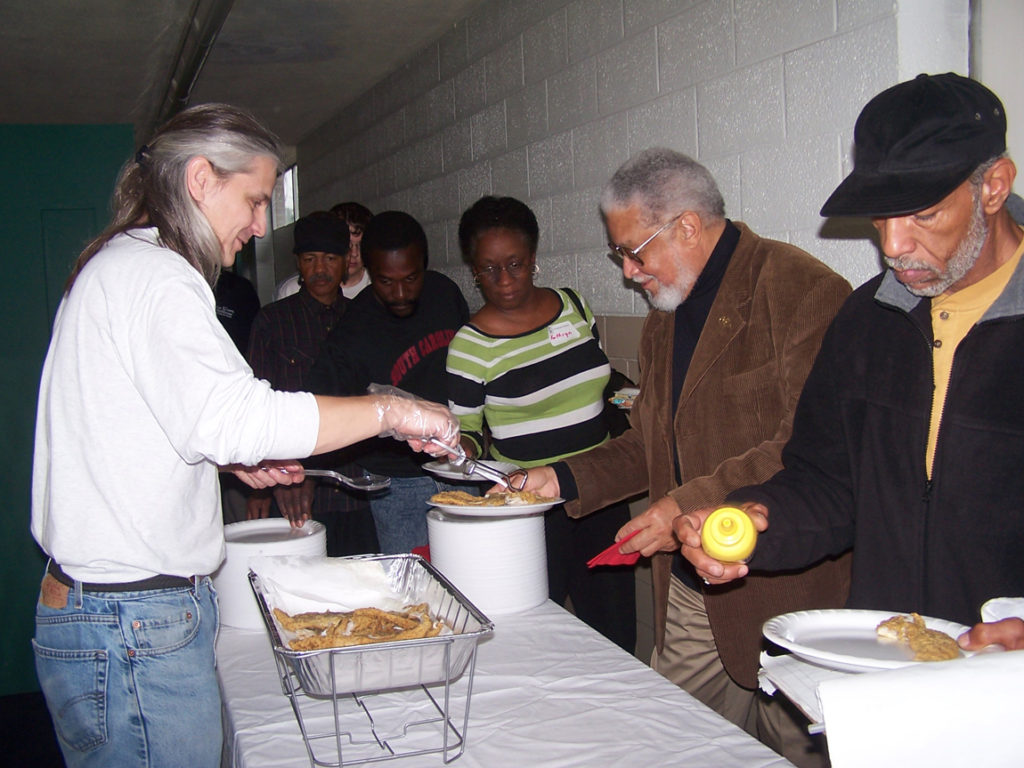
We were heartbroken to learn that our friend and colleague Tim Liszewski died at his home in Columbia on March 28 of coronavirus, which he likely contracted at an Indivisible conference in Wisconsin. He was 60 years old, and leaves behind two children, Aaron and Rebecca Liszewski.
Tim was to be married in May to his longtime partner, Maris Burton. Instead, she is planning his memorial, which will be held when it is safe to gather. Meanwhile, Maris herself is recovering at the home she shares with her sister, Barb.
After feeling sick for a week and suspecting that it might be coronovirus, Tim was tested on March 21. He was told they would get results in 2-5 days, but it wasn’t until four days after his death that the coroner’s office confirmed that he had tested positive. Maris is frustrated that they did not know sooner so they could warn others with whom they’d been in contact.
Their story lays bare the state’s slow response to the pandemic and lack of transparency in testing and tracking of Covid-19 cases in South Carolina. The governor has yet to issue a stay-at-home order, making ours one of just 12 states without one. Tim, who worked as one of the Network’s ACA Navigators in 2013-2014, would be angered by the way the pandemic is playing out here and in other states that refused to expand Medicaid, as detailed in this story.
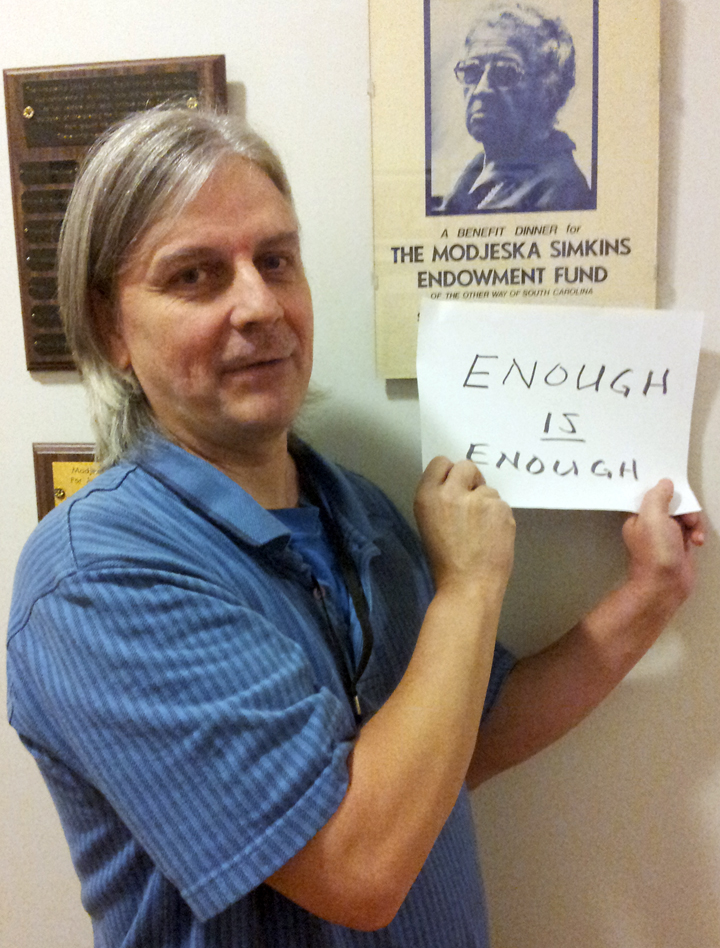
We got to know Tim when he moved to Columbia in 2005 from his native Cleveland, Ohio, to serve as director for the Carolina Peace Resource Center, a longtime Network member. He would go on to work for various political campaigns, in South Carolina and out of state, but stayed in touch. The last time we saw him was at our Fair Maps event at the State House on the first day of session to press lawmakers to end gerrymandering in South Carolina.
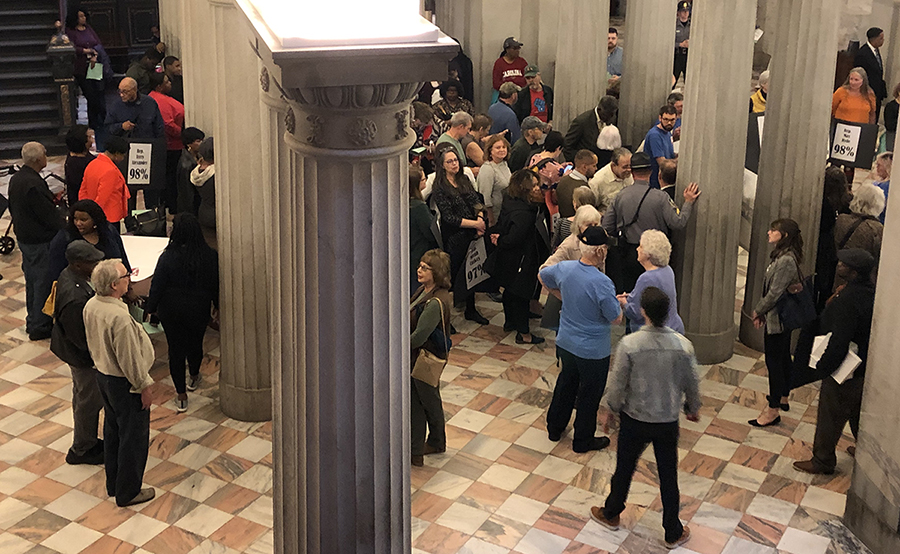
Tim was mild mannered and big hearted. He lived his values. Alongside Maris, he helped feed homeless people in Columbia through Food Not Bombs, and volunteered regularly at Nickelodeon Theater. In a story in The State about his work helping people access health care, Tim said, “This is not a job, it’s a lifestyle.”
Tim was one of 19 Occupy Columbia protesters arrested in November 2010 after refusing to bow to Gov. Nikki Haley’s order to evacuate the State House grounds. Charges were later dropped, and Occupiers were each awarded a $10,000 settlement for violation of their First Amendment rights.
At a hearing during the Occupy Columbia saga, which played out for months, Tim spoke on behalf of those arrested. “There are lobbyists and people with money who are occupying inside the State House. This was our symbolic representation of us taking back the State House grounds for all of the citizens, not just the citizens with influence and with money.”
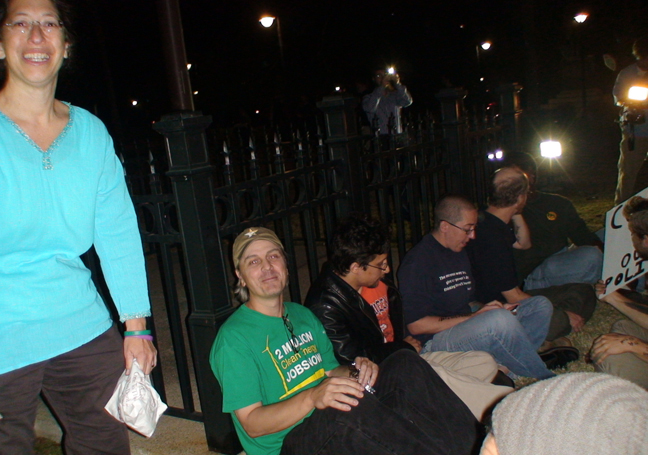
Tim graduated from the Modjeska Simkins School in 2017. In a blog post about the session he said, “Knowing there are people younger than I am who are actually taking up the cause gives me hope and makes me less angry. Let’s make some change that lasts.”
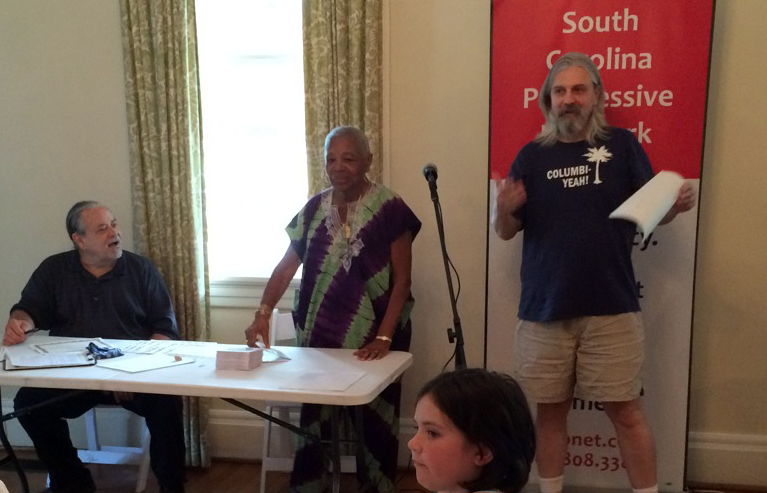
Network Cochair Kyle Criminger had this to say about our colleague. “A creative, civilly disobedient Occupier of Columbia, a first-rate ‘commandant’ (his word) of the Progressive Network’s efforts with the ACA Health Insurance Marketplace, and a senior regional leader of the Indivisible Project, Tim was an astute community organizer, laser-sharp with his words and with purposeful quips. He always studied and adapted in order to be effective where his feet hit the ground beside his fellow progressives. The social justice movement will miss him.”
The Network sends our collective love to Maris, and to her and Tim’s families.
Maris shared this message: Tim’s family, my sister Barb and myself are overwhelmed at the amazing outpouring of love, respect and kindness you are sharing about Tim (and me). He would be embarrassed at the fuss and then say, “is it true? Do they really mean that?” Yes Tim, you are loved by me and so many more. So thank you all for your words and your “Service in Action” that Tim practiced daily. Our lawn looks amazing, we are being fed, groceries supplied, laundry done! and a continuing offer for other services we will be needing. We feel the love. I am working on getting rid of my virus symptom of “the cough and fatigue” and being well enough to tackle household tasks. Be kind, do good deeds, wash hands and take this seriously. It kills.
Hell no, he still won’t go!
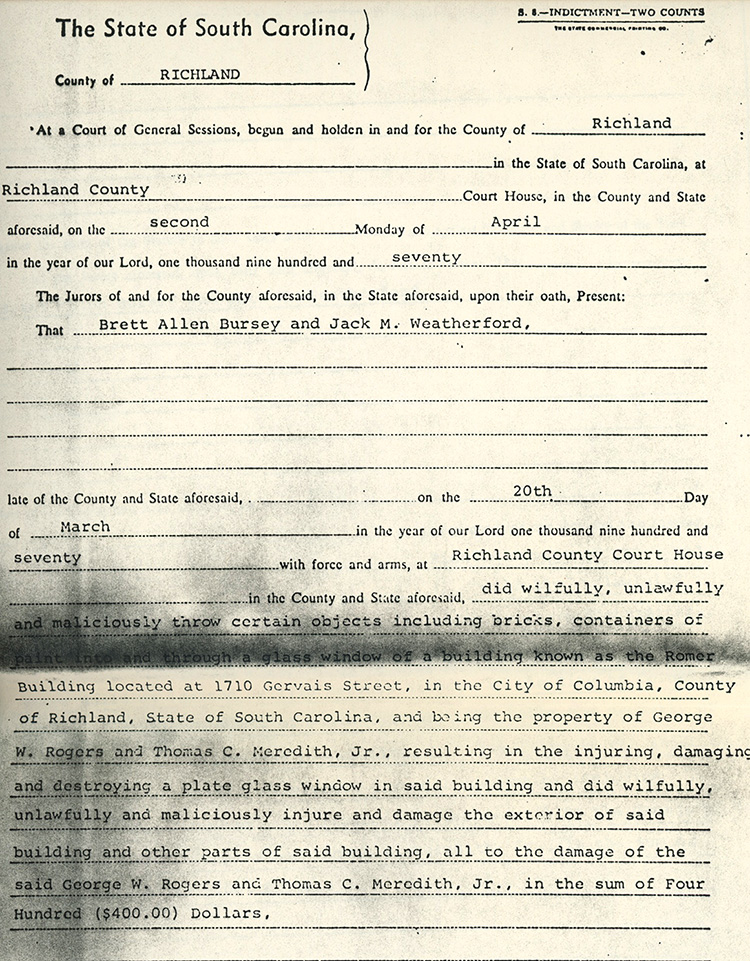
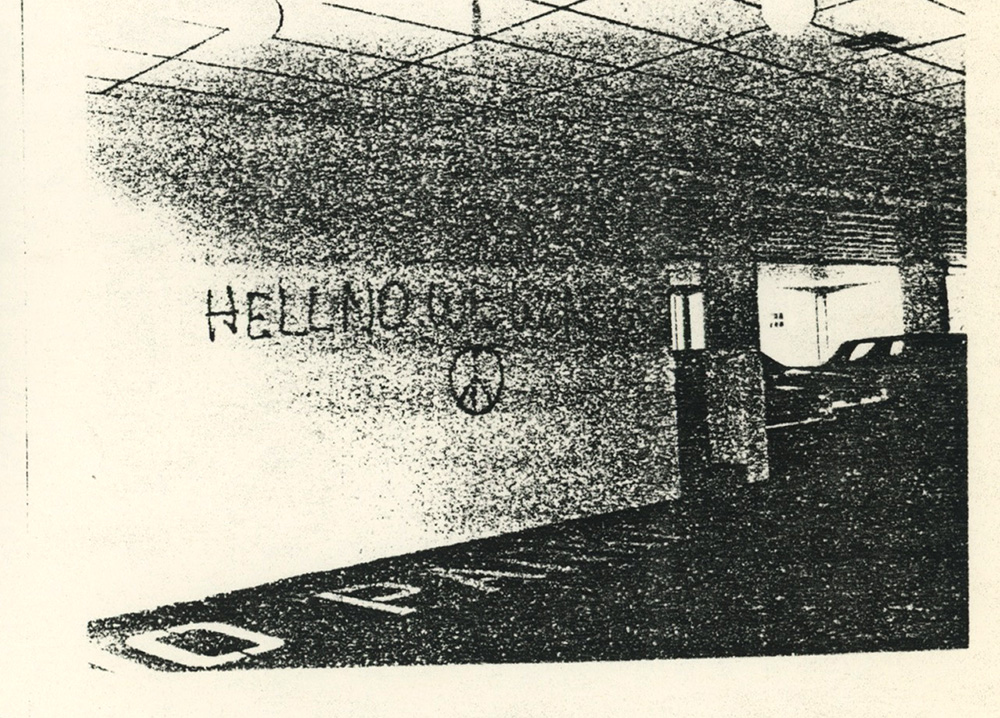
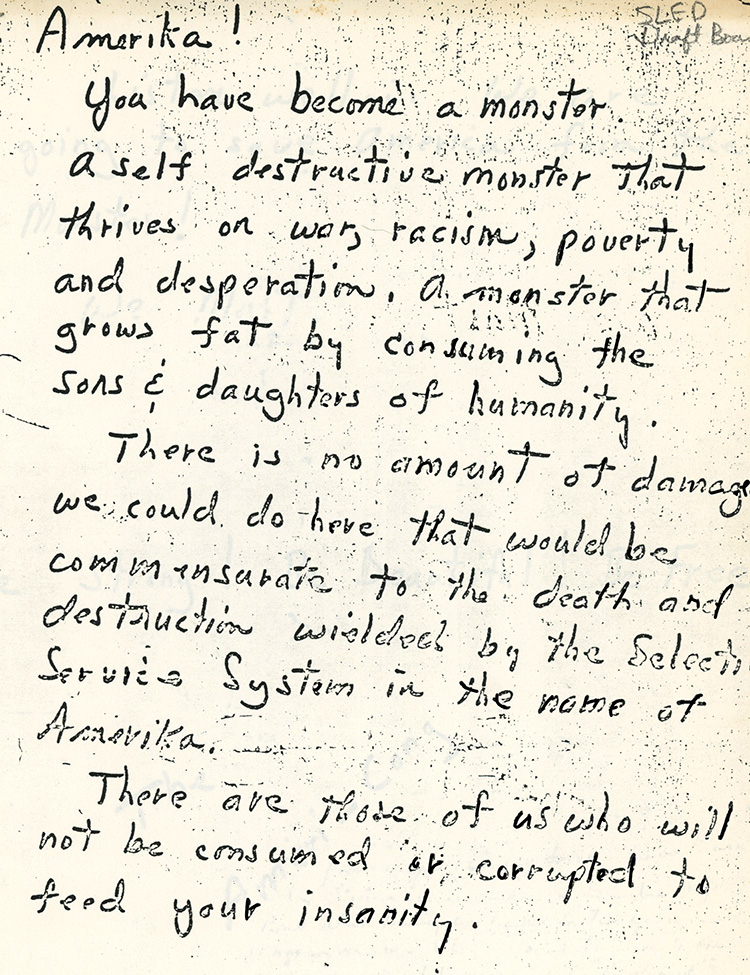
See special edition of The Gamecock recounting what happened after Bursey’s arrest and revelation that his partner in the incident, Jack Weatherford, was an undercover cop.
In face of pandemic, Modjeska Simkins School retools spring session
Instead of hugs and handshakes, students gathering for the first day of the spring session of the Modjeska Simkins School were greeted at the door with hand sanitizer and cleansing wipes. As the Palmetto State comes to terms with the growing coronavirus threat, some students opted to join through video conferencing. It is a sign of the times.
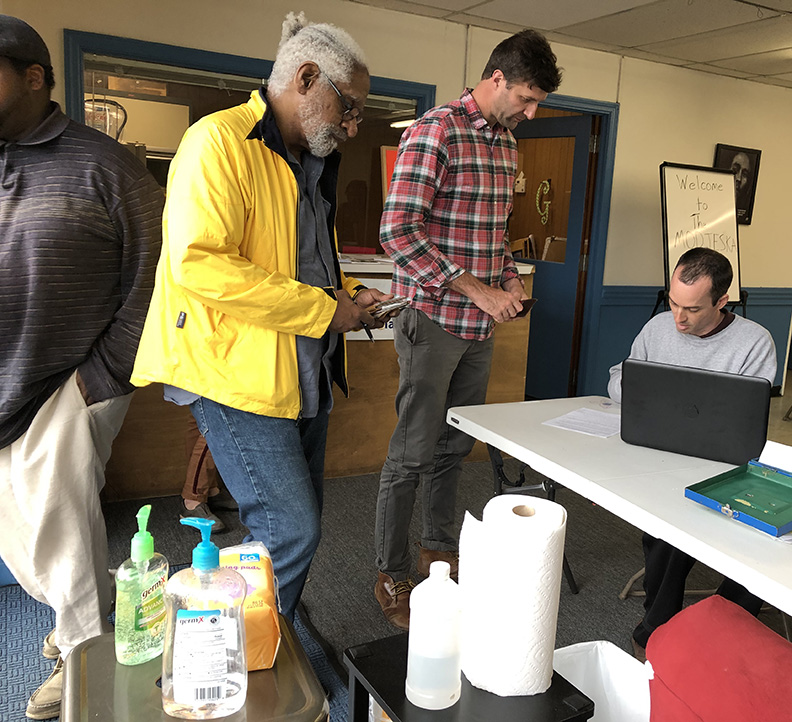
Today, after wide criticism for his slow response to the crisis, Gov. Henry McMaster cancelled classes in the state’s public schools for the rest of the month. Colleges across South Carolina have extended their spring breaks and are preparing to move their classes online.
The Modjeska Simkins School has decided to delay its next class for two weeks, and to live stream the rest of the session. “Being online will be a challenge,” said SC Progressive Network Director Brett Bursey, “but we are looking forward to learning new ways of doing things that will help us expand our distance learning capacity. Eventually, we’d like to make the school available to anyone, anywhere. This will help move us in that direction.”
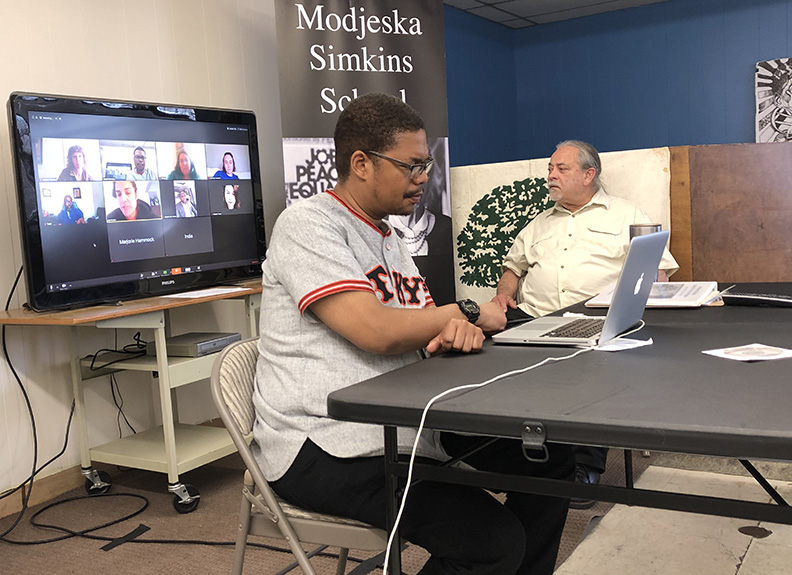
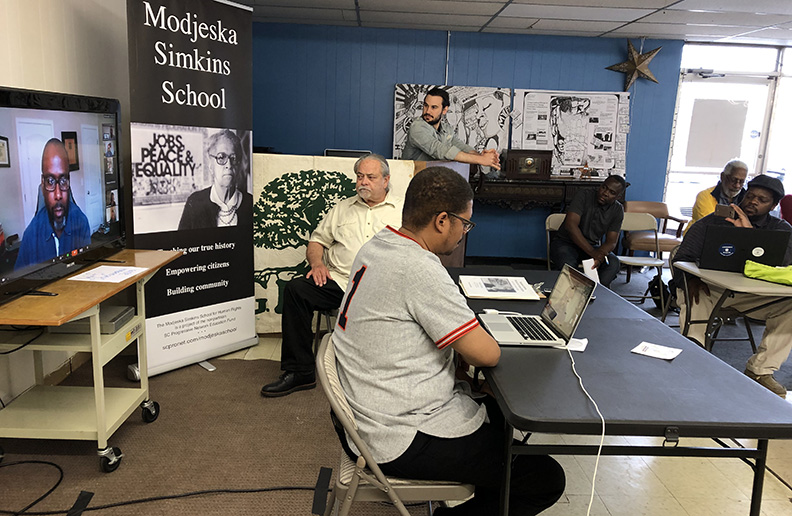
The session will be led by Dr. Robert Greene (Claflin University). Joining him will be Dr. Todd Shaw (USC political science and African American studies), Dr. Jon Hale (USC education history), Dr. Alison McCletchie (USC sociology and anthropology), activist Kevin Gray, and special guests. Classes will be held on alternate Monday evenings through mid-July.
The class of 28 is made up of students with varied interests and backgrounds. The youngest is in 10th grade; the eldest is in her 80s. “We are impressed with this class,” Bursey said. “It will be a different experience for these students than those in years past, but we are confident it will be no less powerful.”
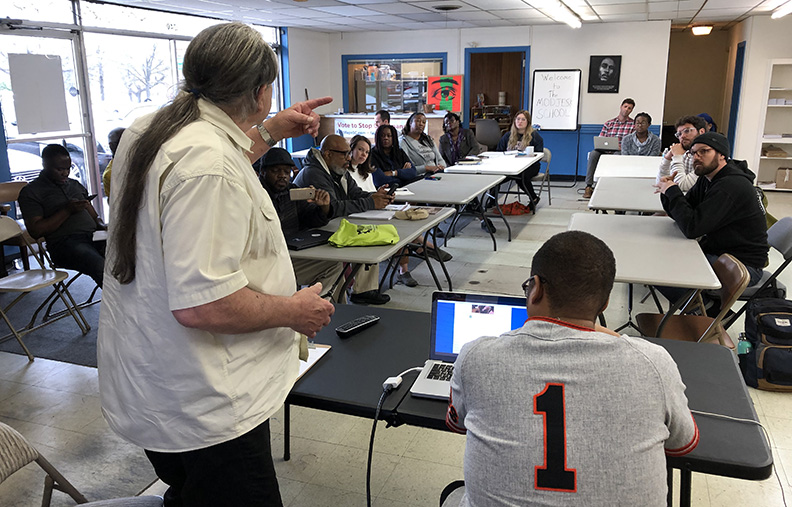
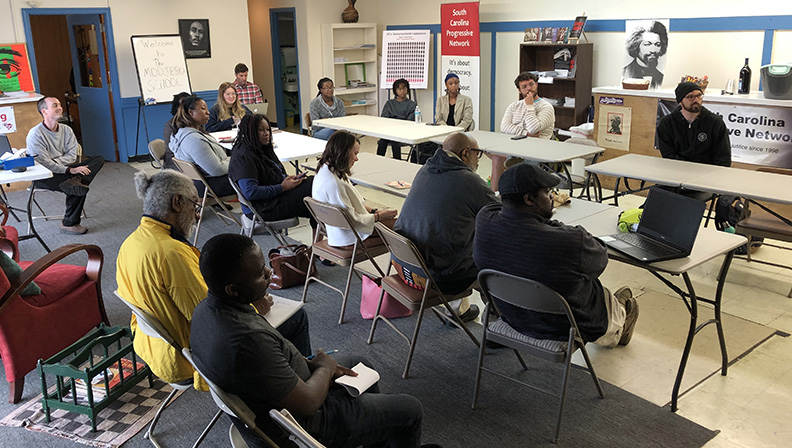
For more about the school, see the web site. Follow on Facebook.
SC Election Protection Hotline Now Live for Presidential Primary
 The nation’s largest nonpartisan voter protection coalition, in alliance with various in-state groups, is ensuring that everyone has an equal opportunity to vote in South Carolina. Election Protection’s 1-866-OUR-VOTE hotline is an important resource for any voter who has questions or is experiencing problems at the polls. In addition, Election Protection volunteers will be on the ground across South Carolina to provide voters assistance.
The nation’s largest nonpartisan voter protection coalition, in alliance with various in-state groups, is ensuring that everyone has an equal opportunity to vote in South Carolina. Election Protection’s 1-866-OUR-VOTE hotline is an important resource for any voter who has questions or is experiencing problems at the polls. In addition, Election Protection volunteers will be on the ground across South Carolina to provide voters assistance.
“This will be the 12th year that this free, nonpartisan service has helped South Carolina voters with problems at the polls,” said SC Progressive Network Education Fund Director Brett Bursey. “The calls to the hotline provide the only real-time, statewide audit of our election system that helps us to identify and address systemic problems.”
Voters are urged to report problems that they experience or witness, so officials can see patterns and improve our election system.
Because not all polling places will be open on Feb. 29, voters should check the hotline or go to Find My Polling Place at scvotes.org. This is the first statewide use of our new voting machines that produce a paper ballot. Voters should verify their ballot was marked correctly prior to inserting it in the scanner. If the ballot does not reflect their choice, voters can turn it in to a poll worker and vote again.
“Voters must be aware that the state’s photo ID requirements will be enforced for voting in the 2020 presidential preference primary,” said Susan Dunn, attorney for the ACLU of South Carolina. All voters are required to bring either a valid driver’s license, DMV-issued ID card, or their photo-voter registration card with them to the polls on Election Day. Dunn pointed out that registered voters with a “reasonable impediment” to not having a photo ID will be allowed to vote, and the votes will be counted without the voter having to appear to defend their ballot at the county certification hearing. “We recommend voters without one of the accepted ID’s is to trade their old paper registration card at their county elections office for one with a photo on it,” Dunn said.
By calling the 1-866-OUR-VOTE hotline, voters can confirm their registration status, find their polling location, and get answers to questions about proper identification at the polls. Voters are encouraged to report any problems with the voting process to Election Protection.
Spanish language assistance is available at 1-888-Ve-Y-Vota (1-888-83-9-8682) or veyvota.org.
Voter Reminders
- Verify your registration status to ensure that you can vote.
- Confirm your polling location, even if it has been in the same place for years.
- Bring required ID, and know your rights regarding providing identification.
- Prepare your registered friends and neighbors, and bring them to the polls!
